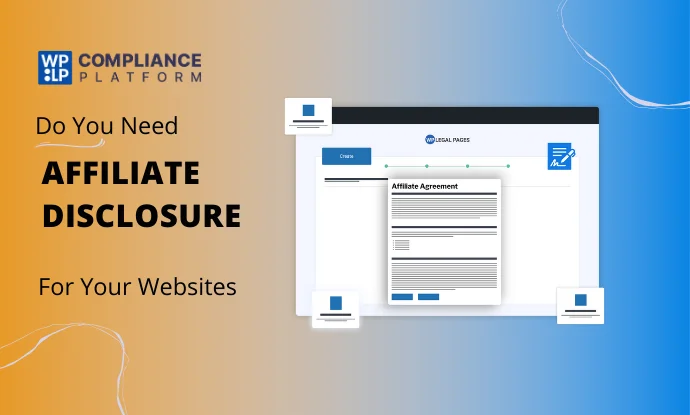Why Your Site Needs an Affiliate Disclosure Policy

Have you ever wondered why transparency is crucial in affiliate marketing?
Affiliate marketing has become a popular way to monetize websites and blogs in the digital age. By promoting products or services through affiliate links, you earn a commission for every sale or lead generated through your referral.
However, with excellent earning potential comes great responsibility. Transparency with your audience is crucial, so having an Affiliate Disclosure Policy is essential. Not only is it a legal requirement in many regions, but it also helps build trust with your readers.
This article’ll explore why your site needs an affiliate disclosure policy, what it should cover, and how to create one for your website.
Why You Need an Affiliate Disclosure Policy
Transparency isn’t just a best practice; it’s a game-changer in building trust and complying with regulations. Let’s dive deeper into the reasons why an affiliate disclosure policy is essential for your site.
Legal Compliance
Legal compliance is not optional for affiliate marketers. Governments worldwide have implemented regulations to ensure consumers know of any financial incentives behind product endorsements.
For example, the FTC in the U.S. requires publishers to use clear and visible disclosures, ensuring consumers understand that links are monetized.
Ignoring these laws can lead to penalties, cease-and-desist orders, or lawsuits. Furthermore, compliance demonstrates professionalism, showing that you take the law and your audience seriously.
Building Trust with Your Audience
Trust is the cornerstone of any successful website or blog. When readers feel you are upfront about your affiliate partnerships, they are more likely to perceive your recommendations as honest and reliable.
Transparency about your earnings fosters loyalty, as readers appreciate your candid approach. This trust can increase click-through rates and conversions, turning casual visitors into long-term followers and buyers.
Ethical Marketing Practices
Ethical marketing goes beyond just following laws—it involves holding yourself to higher standards of integrity. An affiliate disclosure policy ensures your readers are not misled or left in the dark about your motivations.
By clearly stating your financial interests, you set a positive example for others in the industry, contributing to a fairer and more transparent affiliate marketing ecosystem.
Avoiding Misleading Content
Without a disclosure policy, your recommendations might be biased or manipulative. Disclosing affiliate relationships assures readers that your content is not skewed purely by financial gain.
This helps them make informed decisions, increasing their satisfaction with the products or services you promote and reducing the likelihood of complaints or negative feedback.
What Should Your Affiliate Disclosure Cover?
An effective affiliate disclosure policy ensures your audience is fully informed about your relationships with affiliate programs. It’s not just about compliance but also about demonstrating integrity and professionalism. A well-structured disclosure clarifies that your content balances transparency with your readers’ best interests.
Your affiliate disclosure should leave no room for ambiguity. Every detail matters, from where the disclosure is placed to how it’s worded. It should satisfy legal requirements and foster trust and credibility, ensuring that your readers feel respected and valued.
An effective affiliate disclosure policy should include the following:
Clear Statement of Affiliate Relationships
Your disclosure should explicitly mention that affiliate links provide you with financial benefits, such as commissions. Use simple, reader-friendly language, avoiding jargon or complicated explanations. For instance: Some links on this site are affiliate links. I earn a commission if you purchase them at no extra cost.
Disclosure Placement
The placement of your affiliate disclosure is crucial. It should be highly visible, ideally at the beginning of your content or near affiliate links. Readers shouldn’t have to scroll extensively or search for it. For instance, you could include a note at the top of each post, a section in your sidebar, or even a pop-up for full transparency.
Compliance with Regulations
Regulations vary by region, but they all emphasize the need for disclosures to be clear and noticeable. Adhering to these standards protects you legally and reinforces your credibility. For instance, avoid using fine print or hiding the disclosure on a terms-and-conditions page. If you operate globally, familiarize yourself with regional laws like the GDPR (EU) or the Competition and Consumer Act (Australia).
Honesty and Integrity
Beyond the mechanics of compliance, your disclosure should reflect your commitment to ethical practices. Reassure your readers that while you benefit from affiliate commissions, your recommendations are genuine and based on personal experience or thorough research.
How to Make an Affiliate Disclosure for Your Website
Promoting affiliate products requires more than just adding links—it demands transparency and compliance with legal standards. This is where tools like WP Legal Pages come in handy.
WP Legal Pages is a powerful WordPress plugin designed to simplify the creation of legal pages, including affiliate disclosure policies. With pre-built templates and automated features, this plugin ensures your disclosures are transparent, compliant, and strategically placed across your site.
WP Legal Pages – A Free Privacy Policy Generator Plugin

Using WP Legal Pages, a user-friendly privacy policy generator, you can easily create and customize privacy policy pages for your website. With a range of pre-made templates available, you can quickly draft a privacy policy that aligns with your company’s requirements.
WP Legal Pages also offers access to over 35 pre-made policy templates, enabling you to generate various legal documents for your website, including refund policies, terms and conditions, privacy policies, and disclaimers.
Since our goal is to draft a affiliate disclosure for a website, let’s explore how to do this effectively.
Step 1: Installing WP Legal Pages Plugin
1. From your WordPress Dashboard, click on Plugins > Add New.

2. Search for WPLegalPages in the search bar.

3. Click on the Install Now Button.

4. Activate the WP Legal Pages plugin by clicking the Activate button.

Step 2: Configuring WP Legal Pages Plugin
5. Once you have activated the plugin, you can access it directly from the Dashboard.

6. Next, accept the terms of use of the WPLegalPages plugin.

Step 3: Create an Account with WP Legal Pages Plugin
7. To generate legal pages for your website, click on the WP Legal Pages plugin from the dashboard and then click Create Page.

8. This will open the WPLegalPages wizard. From the WPLegalPages wizard, choose the Affiliate Disclouser template and click the Create button.

9. Once you click Create, a popup will appear, asking you to create a new account. Click on New? Create a free account, or if you are an existing user, you can click on Connect your existing account.

Note: Affiliate Disclouser us a pro template and to use this template you need to purchase the pro version of the plugin
10. Once you Sign up, your account will automatically connect to your site, and you can start creating legal pages for your website.

That’s it. You have created an account and can now start creating your website’s Legal Pages. Let’s see how we can create a Affiliate Disclouser for your website.
Step 4: Making a Affiliate Disclouser for the Website
11. Search for Disclouser tab and You be able to see Affiliate Disclouser Templates available with the pro tag on it. Click on the Affiliate Disclouser Policy option to create one for your website.

12. That’s it! Your Affiliate Disclouser policy’s template Preview is ready.

13. Click the Create and Edit option to edit or add additional information to your affiliate disclouser.

14. After you have made the necessary changes, click on Publish.

That’s all! Your Affiliate Disclouseris ready with just a few clicks.
FAQ
Yes. Even if you earn a small amount, disclosure is legally required and helps maintain transparency with your audience.
While a generic disclosure can work, it’s better to tailor disclosures for specific content to ensure clarity and compliance.
No. Affiliate disclosures are necessary for any platform, including YouTube, social media, or email newsletters, where affiliate links are shared.
Use clear language, place the disclosure prominently, and avoid burying it in fine print or hard-to-find locations.
Conclusion
An Affiliate Disclosure Policy is not just a legal requirement—it’s a cornerstone of ethical and transparent marketing. By implementing a clear and concise policy, you show your audience that you value their trust and are committed to honesty.
Transparency through proper disclosures not only helps you comply with global regulations but also strengthens your credibility as an affiliate marketers. Building trust with your audience goes a long way in ensuring sustainable growth for your website.
To simplify the process, consider using tools like WP Legal Pages to create compliant and professional policies with ease. These tools take the guesswork out of compliance, ensuring that your disclosures are not only clear but also strategically placed.
If you liked this article, you can also consider reading:
- What Is Privacy Management and Why Is It Important?
- Top CCPA Fines for Non-Compliance: Key Cases and How to Avoid Penalties
- Florida Digital Bill of Rights (FDBR) — A Complete Guide
Want to create other poliy pages for your website? Then grab WP Legal Pages Plugin.
